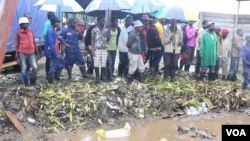In Zimbabwe, doctors and aid organizations have called on the government to improve the country’s water and sanitation amid a typhoid outbreak.
Authorities have started dismantling vendors' malls as part of efforts to contain the outbreak that has struck more than 200 people in the capital, Harare, killing two, and has been detected in other parts of Zimbabwe.
Vendors say authorities must ensure citizens have adequate clean water and sanitation.
Evans Masitara, the secretary general of the group Zimbabwe Association of Doctors for Human Rights, told journalists in Harare that President Robert Mugabe’s government has to do more to contain the outbreak.
“We really do not want to mix issues here. Typhoid is being driven by this water and sewerage problem and not by vendors. The meat vendors, definitely is a health problem; but it is not the driver of typhoid. It is an issue which needs to be addressed, but for now I think the priority should be on water and sewerage systems and refuse collection,” Masitara said.
Last week, the doctors group called on the government to release funds to ensure medicine imports are not delayed. On Tuesday, the doctors said their call had not been answered positively.
'Deplorable'
Health Minister David Parirenyatwa on Tuesday visited Mbare township, the epicenter of the typhoid outbreak. He blamed the city of Harare for failing to ensure hygienic conditions.
“We will not be able to get rid of typhoid or cholera or diarrheal diseases as long as we have conditions like these ones. Even if I say, 'Every hospital in this country, stop treating anything else except typhoid or cholera,' we still do not have a solution. The solution is that we still need hygienic conditions in this country, particularly here in Harare. The filth that is there. The worms that are breeding on top and under the cabbages that are sold, and the sewage that is flowing is just a shocking, a deplorable state.... As long as you do not clean this, you will not get rid of typhoid,” Parirenyatwa said.
In 2008-2009, a cholera outbreak killed more than 4,000 people in Zimbabwe. The waterborne bacterial disease can be treated with antibiotics, but still kills more than 220,000 people worldwide each year.





